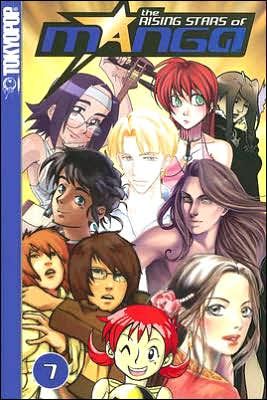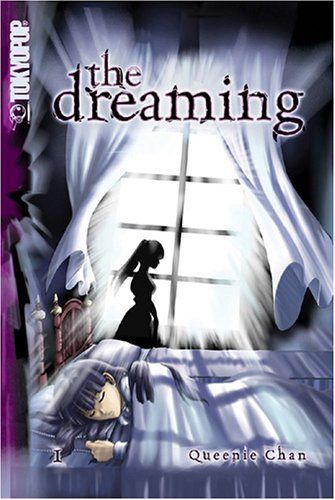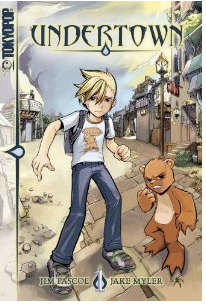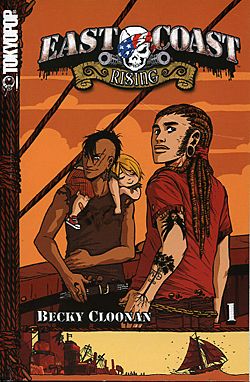There was a time, back in the mid-2000's, when Tokyopop was a bubbling cauldron of talent. With its Rising Stars of Manga competition and global manga program, Tokyopop was a gateway into comics for many talented newcomers, and many of them continue to work in the industry, creating and editing manga and other types of comics. Tokyopop shut down its OEL (Original English Language) manga program and laid off much of its staff in June 2008. Some of the creators continued to work on Tokyopop's licensed books, while others moved on to new endeavors, including BOOM! Studios' Pixar comics and Archaia's Fraggle Rock anthologies.
The news that Tokyopop will be shutting its doors on May 31 inspired many creators to post their thoughts about the Tokyopop experience, and we reached out to some others for their own memories.
Former editor Tim Beedle, who was on staff at the time, looked back with mixed feelings:
There were certainly times where working at Tokyopop could be a frustrating experience. Like most of the editorial team, I came to Tokyopop because I had a genuine interest in comics and manga and wanted to play a role in bringing some great titles to American graphic novel fans, whether they were licensed from Japan or produced in the United States. And I think we did just that while we were there. I'm proud of just about all of the titles I worked on, especially the OEL ones. However, as time went on, the company's interests and priorities seemed to shift. All of a sudden, we weren't simply manga editors—we were film developers, magazine contributors, social media website operators and reality TV producers. All of which are worthwhile career pursuits, but what's wrong with being editors? I think Tokyopop was at its best when its focus remained on publishing, and for all the time I was there, that's what I focused on.
However, despite all that, I look back on my years at Tokyopop with affection. It was a fun company to work for and the employees were some of the greatest people I've ever had the pleasure of working with. It was one of those offices where you genuinely had fun each day you were at work, something that I haven't experienced at any of the offices I've worked in since. I made some great friends while I was there, both within the office and without. I think we all did. I'm proud of the books we've published, and while the original manga program might not have been the financial success we wanted it to be, I believe it played a key role in shaping our current comic scene. In fact, in spite of all the things Tokyopop accomplished for manga in the US, I think its most important legacy may prove to be the talented men and women who rose through its ranks and are now occupying key positions at comic book publishers, game studios and production houses nationwide along with the extremely talented artists and writers who got their start drawing OEL titles for Tokyopop.
Queenie Chan, writer and artist of The Dreaming:
Looking back at The Dreaming, my experience with TOKYOPOP has been a comparatively happy one (compared to other creators who worked for them). I'm one of the few who got all 3 volumes of my work out with them, before moving onto my current work with a different publisher (Del Rey and Dean Koontz, and The Dreaming was directly responsible for that), and I got an Omnibus out of it as well, so I don't really complain. Things haven't been managed as well as I hoped (especially in publicising The Dreaming), but overall, I learned how to do one volume of graphic novel after another, and learned to pace myself in my work and all. Because I was able to complete all 3 volumes of The Dreaming before I moved onto other work, it gave me a solid piece of work to display on my resume, so at least for that, I gotta thank Tokyopop for the opportunity they gave me, and the doors that it opened. I also got a lot of fans in foreign countries—The Dreaming has a lot of fans all over the world, and I often get emails from them. I also got a chance to go to Turkey on a 10-day trip to do talks at Turkish schools, so at least Tokyopop helped in selling the rights to as many overseas companies as they can.
Jim Pascoe, writer of Undertown:
I will forever be grateful to Tokyopop, and specifically to my editor Paul Morrissey, for helping me bring Undertown into the world. There were many great things that came out of this—the book sold through over 58,000 copies (that's AFTER returns), was serialized in about 50 newspapers world wide, and has attracted praise from numerous fans, including Coraline screenwriter/director Henry Selick, who called it "a dark, fun, bittersweet display of incredible imagination."
Undertown is a deeply personal story, based in large part on my dad's heart transplant. I signed the contract within a week of my dad's operation, and it was one of the great joys of my life that my dad lived to see the first volume published. I'm also thrilled that he is still alive today, and while very little can take away from that gift, I'm sad that he has not been able to see all three volumes fully realized, even though the second volume is done and the third is completely written.
As for the future, I am looking at many different options for the best way to re-present Undertown to the fans, both old and new. I hope to have news to share soon.
Sho Murase, who illustrates the Nancy Drew graphic novels for Papercutz, would like to finish her series me2; Tokyopop published the first volume, dropped the series, and left her in limbo:
It has been sad to answer to the readers , whom after so many years , still ask me when the next volume is coming out. As a reader I feel entitled to have the option of buying the continuation of the first book I purchased.
As a writer /artist I wanted to oblige, but was unable to.
Post cancellation syndrome was no fun - and along with money spent on lawyers -(To attempt to negotiate rights to finish the series under a different publisher)-costly.
...
Coming from the animation industry , I have nothing against the use of comics and manga IP for other media, however, I often wondered if those cancelled books may have sold more if Tokyopop would have done a little marketing on them. There was next to none for ME2 .
There were great things about woking on Me2.
Working with Troy Lewter was great . He is an awesome editor , and a good writer.
I did learn a lot about writing working with him.
At her blog, Ink and Thunder, Becky Cloonan reflected on missed opportunities:
A lot of people blame TP's downfall on Borders closing- though I want to talk about something different, about how they stopped being a publisher and started being an IP hoarder. To be a successful publisher I would have thought you'd have to make publishing a priority- and by canceling so many books and concentrating harder on their media developments over the promotion and production of the comics they published, they signed their own death warrant.
That's not to say it's bad to cultivate options for a property outside of comics, but it seemed, for my book and from my perspective at least, that they put zero effort into marketing East Coast Rising. I had issues with the design of the book that went unheard. I even heard that they didn't stock my comic in many stores. I felt like they were more excited when my book garnered attention from animation and video game companies than when it got an Eisner nomination. To me, I don't really care about media rights. Money is great and everything, but I'm in it to make a good book. And I think that's where our interests were divided.
The picture that emerges, on and off the record, is startlingly consistent: Lots of talent, caring editors, not enough attention to follow-through, and a sense of loss over projects that now cannot be finished—although the remnant of Tokyopop has little to gain by hanging on to the rights at this point.
On the other hand, a lot of talented creators got off to some sort of a start, even if they learned a few lessons the hard way, and they will be shaping the comics world for a long time to come.






